What's New
Displaying results 1781 - 1790 of 4914

Resource | Tools,
This document is a tool to assist countries in strengthening systems for national monitoring and evaluation (M&E) of HIV and sexual and reproductive health (SRH).
This tool is intended to be used, first and foremost, by monitoring and evaluation and/or health information management officers involved with national HIV or SRH M&E systems, as well as in SRH or HIV programmes at the sub-national level (for example, at the district level, individual projects, community-based programmes, nongovernmental organization (NGO) programmes and interventions). However, it may also be relevant to other stakeholders who are familiar with the basics of M&E and who use HIV or SRH data for advocacy and for decision-making for policy and programmes (for example, researchers, academics, advocates and policy-makers).

Resource | Publications,
The World Drug Report for 2016, the flagship publication of the United Nations Office on Drugs and Crime (UNODC), is framed by the recent United Nations General Assembly Special Session (UNGASS) on drugs, and draws on key themes developing from the Special Session. It shows the influence of the Outcome Document, and of the Sustainable Development Agenda (SDA).
The Report devotes considerable energy to examining the extent of drug use and its consequences for health. While emphasising the play of uncertainty within its field of knowledge, it nevertheless makes some rather grand claims, such as that one in 20 adults – or a quarter of a billion individuals – used at least one drug in 2014, the last year for which data are available. The narrative of stability is invoked alongside this claim by reminding the reader that this group has remained the same as a proportion of the global proportion, which has expanded in parallel.
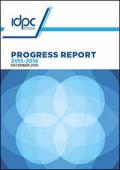
Resource | Publications,
The period covered by this progress report has been highly eventful, not least because of the recent UN General Assembly Special Session on Drugs (UNGASS) which was held in April 2016.
The UNGASS has been a central focus of IDPC’s work during these 13 months. It has been a fast-paced year with tandem efforts to ensure civil society visibility and engagement in the UNGASS process, alongside seeking to positively influence the outcome towards ensuring the prominence of health and human rights.
In addition to the UNGASS, this report highlights IDPC's networking efforts in South East Asia and Latin America and show cases the growth in the Support. Don’t Punish campaign which continues to engage and mobilise new activists in countries as diverse as Burkina Faso, South Africa, Costa Rica, Chile, Lebanon, Serbia, Slovenia, Russia, India, Sri Lanka, Nepal, New Zealand, Myanmar and the Philippines.
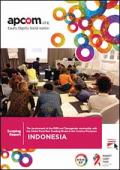
Resource | Publications,
The Global Fund instituted the Country Dialogue, which is an on-going process that occurs at the country level among the government, the private and public sectors, the networks of key populations including people living with HIV, civil society and other technical partners as a means to ensure that meaningful participation happens. It was envisioned to result to a shared vision amongst partners on how to improve health and fight the epidemic that is expected to redound to a robust country Concept Note.
As other countries who are recipients of the Global Fund grants, Indonesia implemented the New Funding Model beginning form the country consultation processes in developing national health strategies and strengthening health and community systems. The country has added, as part of their country dialogue, the conduct of National Gender and HIV Assessment, as well as, HIV and the law/human rights legal review. The country has also identified the stakeholder groups who should be engaged in the process, and the specific activities that need their feedback.
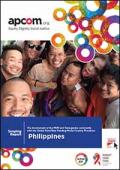
Resource | Publications,
APCOM shares the Global Fund against AIDS, Tuberculosis and Malaria's (GFATM) goal of increased meaningful participation among MSM and transgender community at a country level in Asia and the Pacific. The Global Fund New Funding Model (NFM) is an opportunity for the community to get engaged meaningfully in country processes for a robust grant. Specifically, this report aims to look at and gather the experiences and level of participation of the MSM and Transgender community in the Philippines (New) Funding Model project development process.
This report focuses to capture the following aspects:
1. The level of knowledge and understanding of the MSM and transgender community on the
Global Fund Country Processes;
2. The level of engagement of the MSM and transgender community with the country dialogues
3. The level of engagement of the MSM and transgender community with the Country Coordinating
Mechanism (CCM); and
4. The level of engagement of the community with the Global Fund Country Teams.
This document has been funded by grant 2014097 to the Consortium of MSM and Transgender Networks by the Robert Carr Civil Society Networks Fund.
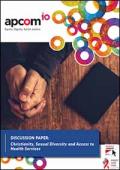
Resource | Publications,
Mainstream, traditional and conservative forms of institutional and popular Christianity in Asia-Pacific countries such as Singapore, the Philippines, India, Hong Kong and Tonga are often disapproving of sexual diversity and gender variance. People who attempt to access HIV preventive measures are often held in suspicion and regarded as indulging in ‘sin’ (Wanje 2012). This becomes particularly problematic for gender variant and sexually diverse people who are often automatically connected to HIV and AIDS. Furthermore, People Living with HIV (PLHIV) are frequently perceived as being punished for their ‘sin’ (Pieters 1994).
This paper examines the attitudes of institutional and popular Christianity towards men who have sex with men (MSM), transgenders (TG) and HIV, the impact of such attitudes towards MSM and TG in relation to HIV prevention and treatment, and Christian teachings and strategies that affirm MSM, TG and PLHIV.
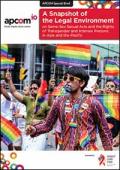
Resource | Publications,
A Snapshot of the Legal Environment on Same-Sex Sexual Acts and the Rights of Transgender and Intersex Persons in Asia and the Pacific is produced on the occasion of the 28th ILGA World Conference in Bangkok, Thailand. The Snapshot provides an overview of the legal environments in the Asia-Pacific region to inform the issues, challenges and opportunities regarding the rights of men who have sex with men and women who have sex with women, as well as transgender and intersex persons.
The data provided in this Snapshot may serve as an indication of the realities of the lives and experiences of LGBT people in the region. However, it is important to understand that inconsistency of legal interpretation within national penal codes and/or policies is often found, and law enforcement does not always adhere to the written legislation.
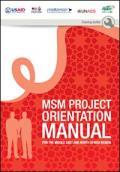
Resource | Tools,
The manual was developed to provide planners and managers working with HIV men who have sex with men (MSM) programme prevention and support services with the necessary information to develop sympathetic, evidence-based and comprehensive HIV prevention and support services for MSM in the Middle East and North Africa (MENA) region. The resource is useful to both experienced programme implementers as well as those who are beginning to plan new HIV prevention and care services for MSM.
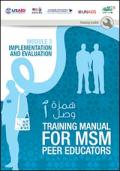
Resource | Tools,
This module is focused on:
- developing an enabling environment for programme implementation through
partnership development and advocacy
- mapping
- reviewing the different components of an effective programme
- the importance of developing effective referral mechanisms
- how to develop indicators to measure progress and monitor programme outputs
the importance of supervision
- programme documentation
- reflecting on an ethical framework to guide programme implementation.
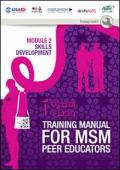
Resource | Tools,
In this module, participants learn and practise the skills necessary to work with their clients to promote and encourage behaviour change. This will include exploring their own attitudes and beliefs in order to reflect on how these may influence their work with clients, both positively and negatively.





